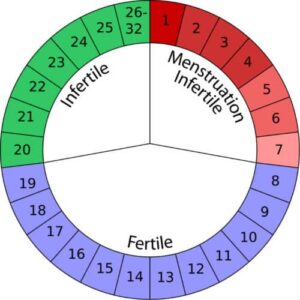Intimacy is an integral part of a couple’s life. It allows them to be close, vulnerable with each other and share precious moments. Pregnancy changes a couple’s sexuality, having to adjust to a new situation. It’s not always negative – on the contrary! A body carrying another can discover unexplored sensuality and feel an extraordinary attraction for the other.
In this article:
- Defining natural contraception methods
- Natural contraception method options
- The benefits of natural contraception methods
Of source, sexuality, reactions to pregnancy and the arrival of a baby are experienced differently by everyone. It’s normal, each person experiences intimacy in their own way. One thing is certain, though. During pregnancy, couples don’t need to worry about contraceptives. But after the baby’s arrival, you will have to figure out what you want to use. It’s important to talk about it before the baby’s arrival because many unplanned pregnancies occur within the weeks and months following childbirth.
After the arrival of a baby, couples often wonder how they can prevent another pregnancy, given that menstrual cycles are altered due to hormonal changes. What method should be used? Will it affect breastfeeding, and how did the woman react to different contraceptives used in the past? There are various solutions available, and it’s a good thing to consider all the possible options before deciding.
For the past several years, we have noted that natural contraception methods and barrier methods have been gaining popularity when family planning. In most cases, couples want to avoid unpleasant side-effects caused by contraceptives containing synthetic hormones.
Defining Natural Contraception Methods
 Natural contraception methods teach women and men to identify the ovulation period, the fertility window where you should avoid sexual relations if you don’t want a pregnancy. Or, on the contrary, to know precisely the right moment when you can conceive. These methods are also known as Ogino natural contraception method in reference to the Japanese gynecologist Ogino (1882-1975). This doctor suggested a way to plan pregnancies based on statistical calculations of previous menstrual cycles, thus the terms cycles method and later the calendar method. The potential fertility period is calculated based on ovulation and the 24 hour survival period of the egg and 3-4 day survival period of sperm. But this method does not take into account early or late ovulation.
Natural contraception methods teach women and men to identify the ovulation period, the fertility window where you should avoid sexual relations if you don’t want a pregnancy. Or, on the contrary, to know precisely the right moment when you can conceive. These methods are also known as Ogino natural contraception method in reference to the Japanese gynecologist Ogino (1882-1975). This doctor suggested a way to plan pregnancies based on statistical calculations of previous menstrual cycles, thus the terms cycles method and later the calendar method. The potential fertility period is calculated based on ovulation and the 24 hour survival period of the egg and 3-4 day survival period of sperm. But this method does not take into account early or late ovulation.

Hormone-free contraception methods are for couples who want to space out their pregnancies and are ready to abstain from sexual relations with penetration for a period. They can also use a barrier method during more fertile days. Natural ways of controlling pregnancies are 95-98% effective when used properly, and 75-88% effective if the method is more or less respected. This means that a couple that chooses to use natural contraception methods must also be prepared to accept a pregnancy after unexpected ovulation. I often met couples having their first baby who said, “Marie, we want nature to take its course, and would like and 2nd baby someday. If it happens now, we are fine with that, we will be delighted to welcome it!” Why not?
If you would like to learn more about the different types of natural contraception methods, read Natural Contraception Method Options.


